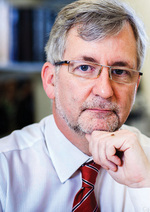Making the most of inspirational leaders
A career-defining experience occurred for a young Alastair Burt during his undergraduate medical training at the University of Glasgow. He fell under the guidance of the inspirational British medical researcher and leader Professor Sir Roddy MacSween. Not only did the relationship nudge the University of Adelaide's new Dean of Medicine into a more research- focused clinical path, but it triggered a life-long belief in the importance of mentors. "It struck me that role models and mentors can have a remarkable influence on some undergraduates and can shape their careers," Professor Burt said. But in subsequent positions he discovered that some institutions have a tendency to keep their best research staff away from students. "It's been one of my passions over the past few years to reverse that trend and ensure that undergraduates have exposure to excellence in research and are motivated by those figures." Professor Burt was leaning towards a career in surgery before encountering Sir Roddy and the discovery that, for him, medical science had the potential to be more intellectually stimulating. He undertook a two-year science degree in addition to medicine and pursued an interest in liver disease with a post-graduate qualification in histopathology, the microscopic examination of disease in tissue. After graduating and an initial career in Glasgow, Professor Burt moved to the University of Newcastle in 1989 where he progressed through various senior positions to become Professor of Pathology and Dean of Clinical Medicine. Throughout his professional life he has devoted time to growing the next generation of clinical academics by encouraging involvement in research, teaching and clinical practice. It is a direction he intends to strongly advocate among medical students in his capacity as Head of the School of Medicine at Adelaide. "I've been very impressed with the undergraduate medical program but I do want to see a greater research ethos and a strong focus on how we shape our courses to make them fit-for-purpose in 10 to 15 years down the line," he said. "A considerable amount can be done without a major overhaul by drip feeding research into the teaching program. Undergraduates should be gradually exposed to our research leaders who may not otherwise have the opportunity of explaining the importance, relevance and excitement of what they are doing. "This is very much in alignment with the University of Adelaide's Beacon of Enlightenment agenda which is about recognising and promoting excellence in different pathways, not just research." To support his efforts Professor Burt will also be encouraging the development of a specific research- focused academic medical society for undergraduates. "Our undergraduates have a very effective body with the Adelaide Medical Students' Society - which includes elements of academic interest and direction - but I think I can help them develop this further," he said. During his time in the UK he acted as an advisor to other universities on clinical academic training and contributed to the National Institute for Health Research. Professor Burt said he had no intention of easing up on his own personal research in his new role. He is an international expert on liver scarring and how cirrhosis develops from alcohol abuse and viruses. His most recent work in the laboratory has involved looking for new treatments for liver fibrosis and ways to interfere with mechanisms that trigger cirrhosis. A particular interest is the hot topic of so-called fatty liver disease related to obesity and diabetes which is very much on the increase in many counties, including Australia. Professor Burt continues to head a European consortium which is going back to the basics and redefining what is meant by the different stages of fatty liver disease. "The benefit of the internet means I can do that work remotely and access material on liver biopsies which are being generated from a large cohort of patients from all around Europe," he said. Professor Burt has already held fruitful discussions with hepatologists and gastroenterologists at the University of Adelaide to seek their involvement in the research. His extensive experience of liver disease has seen him edit the last two editions of the Pathology of the Liver - the international 'bible' on how to interpret liver biopsies - originally authored by former mentor and long-time friend, Sir Roddy. It's a role which has brought him into close contact with other leaders in the field around the world. Remaining clinically active is a priority and he intends on using his range of skills working with clinicians in the wards in helping to diagnose liver disease. "I believe very strongly that it is important for a Dean of a medical school to continue to develop themselves in their own clinical academic field," he said. Another important area for Professor Burt is nurturing the relationship between the University of Adelaide and the healthcare sector. "I'm really excited to have come at a time when there are lots of changes in terms of capital projects but also changes in the structure of the health services in South Australia. "I hope to play a key role in capitalising on the opportunities these changes bring and will work very hard on ensuring that the relationship between the University of Adelaide and healthcare partners is as strong as possible."
|





